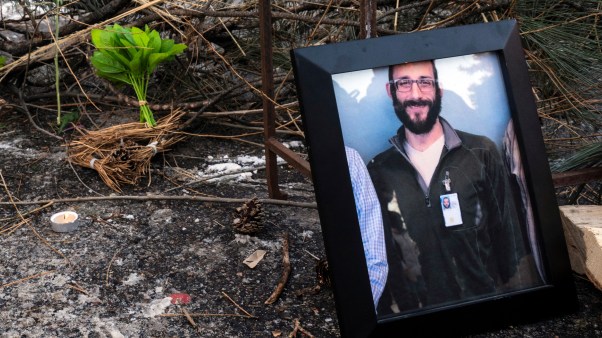The family foundation of the late Thomas Kinkade demanded that the Department of Homeland Security (DHS) stop posting his art on social media. According to the family, the government agency misused “Morning Pledge”—which depicts children holding hands to hearts as an American flag is raised—“to promote division and xenophobia.” DHS posted the image on X with the message “Protect the Homeland.” The rest of the government agency’s social media feed was filled with posts cheering the mass deportation of immigrants. Kinkade, the self-branded “painter of light” whose art has been frequently criticized as sentimental, originally said he wanted “Morning Pledge” to capture the promise of liberty and justice for all.
United States: Students Get AI Help
Cedarville University is claiming the title of first evangelical college to launch a campus-wide artificial intelligence initiative. The Ohio school is subscribing to ChatGPT Edu and making it available to its more than 6,000 students. According to a school spokesman, the chatbot program will help them “think biblically about AI, be more prepared for the rapidly changing marketplace, and become more time-efficient—leaving additional time for personal and spiritual growth.” A 2024 marketing study found that more than a third of college freshmen use AI to take notes, study, and write essays. A similar number of instructors use AI for their jobs.
Dominican Republic: No to Gold and Copper Extraction
Thousands of evangelicals marched in protest against a Canadian company’s plans to mine gold and copper in the San Juan Valley. GoldQuest says it will extract between 7 million and 21 million tons of precious metals in “a low-impact underground mining development opportunity with the potential to serve as a significant economic driver.” But evangelicals, organized by five ministerial organizations, fear environmental disaster. “The gold mine in its current location will cause irreversible damage,” said a statement read by pastor Ramón Campechano. “Our forests do not belong to any transnational company that only seeks to profit.”
Argentina: Evangelical Existence on the Books
Argentina will now legally recognize non-Catholic religious groups, a change evangelicals have wanted for 30 years. Until now, the country protected religious freedom but only granted legal status to the Roman Catholic Church, which the Argentine constitution calls the “apostolic faith.”
Sweden: Nation Watches Church Move
An iconic wooden church, often described as one of Sweden’s most beautiful buildings, has been moved across town to make way for an iron ore mine. Thousands of people, including King Carl XVI Gustaf, lined the streets to watch the three-mile trip unfold carefully over 48 hours. More witnessed the event on live TV. The 131-foot tall, 741-ton Lutheran church in Kiruna was designed with a mix of architectural styles, paying tribute to Gothic cathedrals, Norwegian stave churches, and Indigenous Sami huts. The altar is art nouveau. Bishop Olof Bergqvist, a major force behind the effort to translate the Bible into Sami, consecrated the church in 1912. Now, the ground it was built on is in danger of collapsing due to continued mining. Around 3,000 homes are also being moved to safety.
Germany: No Sanctuary in Sanctuaries
Police arrested an asylum-seeking Christian convert at an Independent Evangelical-Lutheran Church where he sought sanctuary in Berlin. The man is from Afghanistan, according to German pastor Gottfried Martens, and faces “immediate danger to life and limb” if he’s deported. He first entered Europe in Sweden, however, and, according to current rules, is only eligible for asylum if he applies there. The mayor of Hamburg, a center-left Social Democrat, attacked his center-right counterpart, the mayor of Berlin, for letting churches stand in the way of deportation. The number of immigrants seeking sanctuary in churches has risen from 335 in 2020 to 2,386 in 2024, according to government records. An individual’s right to asylum is protected in the German constitution, but some current leaders have suggested that was a mistake and should be amended. The Berlin pastor who has Afghans living in his church said he believes refugees from Muslim countries have been sent by Christ.
Ghana: Government to Review Prophecies
The Presidential Envoy for Interfaith and Ecumenical Relations has told religious leaders to submit any prophecy concerning national leaders, national security, or public stability to the government for review. Elvis Afriyie Ankrah, who works for the presidential administration, said the review process will prevent unnecessary panic and instability. In the run-up to the last election, one prophet declared that Mahamudu Bawumia would defeat John Mahama, causing some to doubt the results when Mahama won with 56 percent of the vote. At several 2025 watch night services, prophets foretold the impending deaths of prominent people (whom they did not name). The government request has sparked debate over the legitimacy of prophecy and government regulation of churches.
Eritrea: Seven Pastors Still Imprisoned
Voices for Justice, a consortium of Christian groups concerned about religious liberty, called on the government to release seven church leaders who have been imprisoned without any charges for 21 years. There are some reports that the pastors are held in solitary confinement.
Turkey: Biblical City Excavated
The archaeological excavation of Colossae has begun. The ancient city was a significant settlement at least 500 years before Christ, but Colossae is most famous as the home of the early church that received two New Testament epistles: Paul’s letters to the Colossians and to Philemon. The excavation, supervised by experts from Pamukkale University, may shed light on the “human tradition and the elemental spiritual forces of this world” (Col. 2:8) that Paul worried would distract Christians from the truth that “God made you alive with Christ” (v. 13).
Israel: No Chicken in Church Meals
Gaza Baptist Church has stopped serving chicken. According to pastor Hanna Massad, who moved to the US in 2008, meat has become too hard to find or too expensive. Plates now contain only rice and a vegetable, often eggplant, and cost the ministry $7 to $10 each. The church has handed out more than 47,000 hot meals since the war began with Hamas’s attack on Israeli civilians in 2023. A three-month blockade early in 2025 caused a hunger crisis in Gaza. The World Health Organization reported 63 people died of complications related to malnutrition in July. Israeli authorities dispute the report and Israel’s supporters point to persistent problems with UN food distribution. Ken Isaacs, a VP with Samaritan’s Purse, said he witnessed “thinning he hadn’t seen since Bosnia,” but noted there’s no good way to deliver aid in a war zone like Gaza. “It’s just a tough situation,” he told CT, “and at the end of the day, it’s only going to be resolved by getting enough food down on the ground.”
China: Bible Art Moves a Nation
Beijing pastor Wang Wenfeng and his church, SanQi, wanted 1,189 people to each hand-copy a chapter of Scripture in 2019 for the 100th anniversary of the Chinese Union Version translation of the Bible. Within days of sharing the idea online, however, thousands volunteered, including members of underground house churches, people who are part of officially recognized Three-Self Patriotic Movement congregations, and nonbelievers who love the art of calligraphy. To date, millions of Chinese people have taken up the Bible art challenge. Wang has collected many of the handwritten Bible texts in a five-story house in Wenzhou. It was open to the public until authorities raised concerns about the influx of visitors disrupting traffic. Wang shut it down in March 2025.













